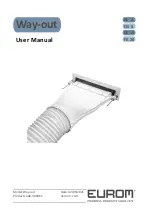
4 - WATER CONNECTIONS
4.1 PRELIMINARY INFORMATION
General
Operate in compliance with safety regulations in force .
For detailed information (dimensions, weight, technical
characteristics etc.) please refer to the “Technical information”
section.
Use single protection devices : gloves, glasses ecc.
.
Components
Selection and installation of system components must be carry
out by installer.
Cut-off valves installed at inlet and outlet allow maintenance
operations without having to empty the system
Thermometers and manometers installed at entry and exit for
facilitate inspection and maintenance.
An air bleed valve is installed in all of the highest points of the
system allowing the venting of the circuits air.
Drainage taps are installed in the lowest points of the system
to allow bleeding.
An expansion tank allows the correct system pressure to be
maintained when the water temperature varies. It must be
dimensioned as a function of water content
The filter, if not present on-board the machine, must be
installed immediately in the water input of the unit, in a
position that is easily accessible for cleaning.
The filter should never be re-moved, this operation
invalidates the guaranty .
The hydraulic pipes weight mustn’t burden on the unit
connections .
Operation sequence
Close all vent valves in the high points of the unit hydraulic
circuit
Close all drain valves in the low points of the unit hydraulic
circuit
1. Carefully wash the system with clean water: fill and drain
the system several times.
2. Apply additives to prevent corrosion, fouling, formation of
mud and algae.
3. Fill the plant
4. Execute
leakage
test.
5. Isolate the pipes to avoid heat dispersions and formation of
condensate.
6. Leave various point of service free (wells, vent-holes etc).
Neglecting the washing will lead to several filter cleaning
interventions and at worst cases can cause damages to the
exchangers and the other parts.
Water quality
The water quality is determined by the following factors, avoid
therefore:
- Inorganic salts
- pH
- Biological load (seaweeds etc)
- Suspended solids
- Dissolved oxygen
Water with inadequate characteristics can cause:
- pressure drop increase
- energy efficiency decrease
- corrosive symptom increase
Risk of freeze
If the unit or the relative water connections can be subject to
temperatures close to 0°C adopt measures for prevent risk of
freeze.
For example:
- Mix water with ethylene glycol
- Safeguard the pipes with heating cables placed under
the insulation
- Empty the system in cases of long non-use and check
that: :
- there are no closed taps present that could trap water
even after emptying
- there are no low points in which water can stagnate
even after emptying; carry out any blowing required
Anti-freeze solution
Consider that the use of anti-freeze solution determines an
increase in a pressure drop.
Make sure that the glycol type utilized is inhibited (not
corrosive) and compatible with the hydraulic circuit components
(pump etc).
Do not use glycol mixtures of different type (for example
et propylene)
Operating pressure
Max. pressure in the hydraulic circuit
6bar
.
Vent the unit
A
- Unscrew the panel screws.
- Remove panel.
Vent through the valve located near the coil
A
Summary of Contents for DFO 5 - 9 - 17
Page 17: ...6 ELECTRICAL CONNECTIONS 6 3 ELECTRIC PANEL SIZES 5 9 ELECTRIC PANEL SIZES 17 X1 X1 A B A B C2...
Page 24: ...6 ELECTRICAL CONNECTIONS...
Page 43: ...NOTES...
Page 44: ...NOTES...











































